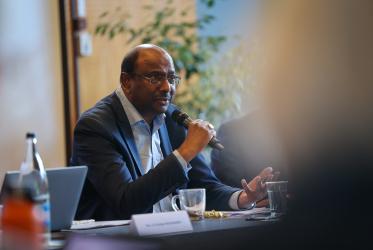The theme of the conference is “Pentecostal Revival in the Next Generation,” accompanied by the prayer “Holy Spirit, come, raise up the next generation!”
Participants underlined that our world needs a spiritual and moral renewal, including leaders open to constantly be transformed by the Holy Spirit in order to be able to speak prophetically to the challenges of our times. One of the key messages was that revival happens when relationships of all sorts are being restored.
The World Council of Churches (WCC) was represented by Rev. Prof. Dr Ioan Sauca, WCC acting general secretary, and Dr Vasile-Octavian Mihoc, programme executive for Ecumenical Relations and Faith and Order.
In a workshop dedicated to “Ecumenical Legacy of Rev. David Yong-gi Cho and the Global Ministry of Yoido Full Gospel Church” (Pentecostal), Sauca mentioned that Rev. Cho, the founder of this largest world’s Christian congregation, was among those who extended the invitation to WCC to have the 10th assembly in Busan and encouraged his church members to participate. In one of the evenings, the Korean Pentecostals offered an ecumenical prayer service. Sauca mentioned that he was impressed by the holistic ministry of Rev. Cho and his church.
The legacy of Busan where the ecumenical Pilgrimage of Justice and Peace was coined brought its harvest in Karlsruhe and continues for the period until the next WCC assembly as a Pilgrimage of Justice, Reconciliation and Unity.
In the workshop organized by the Global Christian Forum on the theme “Who is missing at the table?” Mihoc shared the history of the relations between Pentecostals, including the work of a joint consultative group. Mihoc also mentioned the participation of Pentecostals in the work of the WCC Commission on Faith and Order, especially in the area of ecclesiology, sharing at the same time a summary of the responses to the document The Church. Towards a Common Vision, which affirms that contemporary ecumenism requires serious engagement with growing numbers of Pentecostal and new emerging churches.
Dr Jean-Daniel Plüss, member of the joint consultative group representing Pentecostals, offered a description of the conference: “It was a gathering of classical Pentecostal leaders from all continents representing about 150 million believers from different denominations, communities and organizations. This year’s theme focused on the challenges and possibilities for the leadership of the future churches of this worldwide movement. The program was a mix of exuberant worship, inspiring messages, workshops and panel discussions on a variety of issues. On Friday a special visit to the Demilitarized Zone was organized which culminated in a prayer meeting for peace on the Korean Peninsula. As a movement, Pentecostals have always insisted that God’s Holy Spirit is active among all Christians. Accordingly, an important aspect of the conference was the presence of ecumenical guests from various historic churches and organizations.”
There are eight WCC member churches coming from the Pentecostal family.
The joint consultative group was established at the WCC 8th Assembly in Harare after the WCC recognized the growing need to consolidate existing relations with Pentecostals and create new ones, as well as to initiate study on issues of common interest, to explore different forms of participation, and to encourage collaboration.







